The views expressed in our content reflect individual perspectives and do not represent the official views of the Baha'i Faith.
Many, many modern thinkers have reached the same essential conclusion: human beings all over the world have begun to develop a more universal consciousness and global identity:
Increasing economic globalization creates conflicts that can only be constructively managed if individuals and groups realize they now belong to a single people. The required sense of such a community does not involve a social group identity—as though being human consisted of being categorized as a member of a superordinate group. Rather, it involves the realization that personal identity depends on the socio-emotional relations involved in community and that the current situation requires a community that is global rather than local or national. – Joseph de Rivera and Harry A. Carson, The Journal of Social and Political Psychology, 12 December 2015.
We live with 7 billion fellow humans on a small, warming planet. The cosmopolitan impulse that draws on our common humanity is no longer a luxury; it has become a necessity. – Kwame Anthony Appiah, The Lies that Bind, p. 219.
The old identities are gradually being replaced by universal identity, based on the notion that everyone is equal. People are no longer dependent on the political preference or profession or social status of their parents, nor the religion of their village or the old national prides or grudges against other countries. If anyone wants to be of more value, he should earn it through his own personal actions and achievement in life. – Niek Berendsen, WonkBridge, May, 2017.
From a Baha’i perspective, this dramatic change in how we see ourselves has come about because of the universalizing spiritual impulse generated by the Baha’i revelation:
… Baha’u’llah, we should readily recognize, has not only imbued mankind with a new and regenerating Spirit. He has not merely enunciated certain universal principles, or propounded a particular philosophy, however potent, sound and universal these may be. In addition to these He, as well as Abdu’l-Baha after Him, has, unlike the Dispensations of the past, clearly and specifically laid down a set of Laws, established definite institutions, and provided for the essentials of a Divine Economy. These are destined to be a pattern for future society, a supreme instrument for the establishment of the Most Great Peace, and the one agency for the unification of the world … – Shoghi Effendi, The World Order of Baha’u’llah, p. 19.
This new pattern for a future society, the Baha’i teachings say, will slowly unfold against a backdrop of failing and outmoded institutions and ideas—in fact, that process has already begun. The unworkable old forms of governance and ethics and identities will gradually fade into obscurity, and new global governance, ethics and identities will emerge:
The call of Baha’u’llah is primarily directed against all forms of provincialism, all insularities and prejudices. If long-cherished ideals and time-honored institutions, if certain social assumptions and religious formulae have ceased to promote the welfare of the generality of mankind, if they no longer minister to the needs of a continually evolving humanity, let them be swept away and relegated to the limbo of obsolescent and forgotten doctrines. Why should these, in a world subject to the immutable law of change and decay, be exempt from the deterioration that must needs overtake every human institution? For legal standards, political and economic theories are solely designed to safeguard the interests of humanity as a whole, and not humanity to be crucified for the preservation of the integrity of any particular law or doctrine. – Shoghi Effendi, The World Order of Baha’u’llah, p. 42.
Of course, we’re all human, and we all have our individual identities. Those identities tend to define how we relate to others, and give us a place to stand in the world, a way to belong. We develop, sustain and hold on to those identities because they help define our relationships to all other humans. But the old identities of class, creed, color, culture or country have become barriers to the realization of our greatest and most profound identity—as members of one human family and citizens of one world. This unity of identities, the Baha’i teachings promise, will slowly suffuse the world with its light.
Abdu’l-Baha explained how these “candles of unity” would gradually enlighten the world:
Behold how its light is now dawning upon the world’s darkened horizon. The first candle is unity in the political realm, the early glimmerings of which can now be discerned. The second candle is unity of thought in world undertakings, the consummation of which will erelong be witnessed. The third candle is unity in freedom which will surely come to pass. The fourth candle is unity in religion which is the corner-stone of the foundation itself, and which, by the power of God, will be revealed in all its splendour. The fifth candle is the unity of nations—a unity which in this century will be securely established, causing all the peoples of the world to regard themselves as citizens of one common fatherland. The sixth candle is unity of races, making of all that dwell on earth peoples and kindreds of one race. The seventh candle is unity of language, i.e., the choice of a universal tongue in which all peoples will be instructed and converse. Each and every one of these will inevitably come to pass, inasmuch as the power of the Kingdom of God will aid and assist in their realization. – Abdu’l-Baha, Selections from the Writings of Abdu’l-Baha, p. 32.
This is our path forward. The Baha’i teachings tell us that path will lead us to unity:
If the world should remain as it is today, great danger will face it. But if reconciliation and unity are witnessed, if security and confidence be established, if with heart and soul we strive in order that the teachings of Baha’u’llah may find effective penetration in the realities of humankind, inducing fellowship and accord, binding together the hearts of the various religions and uniting divergent peoples, the world of mankind shall attain peace and composure, the will of God will become the will of man and the earth a veritable habitation of angels. Souls shall be educated, vice be dispelled, the virtues of the world of humanity prevail, materialism pass away, religion be strengthened and prove to be the bond which shall cement together the hearts of men. – Abdu’l-Baha, The Promulgation of Universal Peace, p. 320.





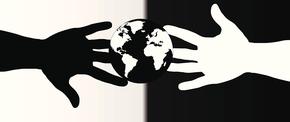



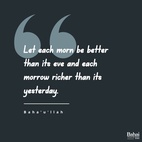

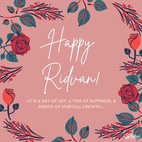
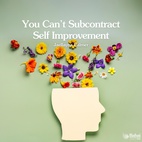
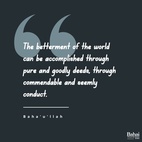
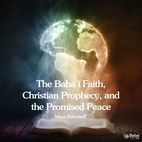
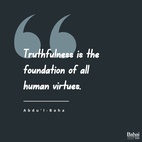

Comments
Sign in or create an account
Continue with Facebookor